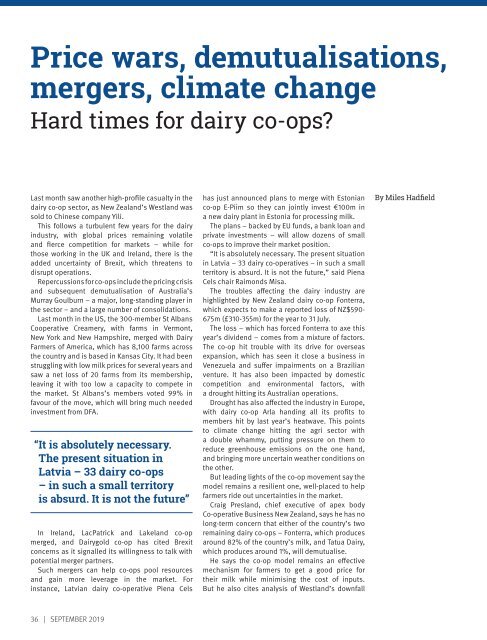Co-op News September 2019: Agriculture
How are co-ops working agriculture?
How are co-ops working agriculture?
You also want an ePaper? Increase the reach of your titles
YUMPU automatically turns print PDFs into web optimized ePapers that Google loves.
Price wars, demutualisations,<br />
mergers, climate change<br />
Hard times for dairy co-<strong>op</strong>s?<br />
Last month saw another high-profile casualty in the<br />
dairy co-<strong>op</strong> sector, as New Zealand’s Westland was<br />
sold to Chinese company Yili.<br />
This follows a turbulent few years for the dairy<br />
industry, with global prices remaining volatile<br />
and fierce competition for markets – while for<br />
those working in the UK and Ireland, there is the<br />
added uncertainty of Brexit, which threatens to<br />
disrupt <strong>op</strong>erations.<br />
Repercussions for co-<strong>op</strong>s include the pricing crisis<br />
and subsequent demutualisation of Australia’s<br />
Murray Goulburn – a major, long-standing player in<br />
the sector – and a large number of consolidations.<br />
Last month in the US, the 300-member St Albans<br />
<strong>Co</strong><strong>op</strong>erative Creamery, with farms in Vermont,<br />
New York and New Hampshire, merged with Dairy<br />
Farmers of America, which has 8,100 farms across<br />
the country and is based in Kansas City. It had been<br />
struggling with low milk prices for several years and<br />
saw a net loss of 20 farms from its membership,<br />
leaving it with too low a capacity to compete in<br />
the market. St Albans’s members voted 99% in<br />
favour of the move, which will bring much needed<br />
investment from DFA.<br />
“It is absolutely necessary.<br />
The present situation in<br />
Latvia – 33 dairy co-<strong>op</strong>s<br />
– in such a small territory<br />
is absurd. It is not the future”<br />
In Ireland, LacPatrick and Lakeland co-<strong>op</strong><br />
merged, and Dairygold co-<strong>op</strong> has cited Brexit<br />
concerns as it signalled its willingness to talk with<br />
potential merger partners.<br />
Such mergers can help co-<strong>op</strong>s pool resources<br />
and gain more leverage in the market. For<br />
instance, Latvian dairy co-<strong>op</strong>erative Piena Cels<br />
has just announced plans to merge with Estonian<br />
co-<strong>op</strong> E-Piim so they can jointly invest €100m in<br />
a new dairy plant in Estonia for processing milk.<br />
The plans – backed by EU funds, a bank loan and<br />
private investments – will allow dozens of small<br />
co-<strong>op</strong>s to improve their market position.<br />
“It is absolutely necessary. The present situation<br />
in Latvia – 33 dairy co-<strong>op</strong>eratives – in such a small<br />
territory is absurd. It is not the future,” said Piena<br />
Cels chair Raimonds Misa.<br />
The troubles affecting the dairy industry are<br />
highlighted by New Zealand dairy co-<strong>op</strong> Fonterra,<br />
which expects to make a reported loss of NZ$590-<br />
675m (£310-355m) for the year to 31 July.<br />
The loss – which has forced Fonterra to axe this<br />
year’s dividend – comes from a mixture of factors.<br />
The co-<strong>op</strong> hit trouble with its drive for overseas<br />
expansion, which has seen it close a business in<br />
Venezuela and suffer impairments on a Brazilian<br />
venture. It has also been impacted by domestic<br />
competition and environmental factors, with<br />
a drought hitting its Australian <strong>op</strong>erations.<br />
Drought has also affected the industry in Eur<strong>op</strong>e,<br />
with dairy co-<strong>op</strong> Arla handing all its profits to<br />
members hit by last year’s heatwave. This points<br />
to climate change hitting the agri sector with<br />
a double whammy, putting pressure on them to<br />
reduce greenhouse emissions on the one hand,<br />
and bringing more uncertain weather conditions on<br />
the other.<br />
But leading lights of the co-<strong>op</strong> movement say the<br />
model remains a resilient one, well-placed to help<br />
farmers ride out uncertainties in the market.<br />
Craig Presland, chief executive of apex body<br />
<strong>Co</strong>-<strong>op</strong>erative Business New Zealand, says he has no<br />
long-term concern that either of the country’s two<br />
remaining dairy co-<strong>op</strong>s – Fonterra, which produces<br />
around 82% of the country’s milk, and Tatua Dairy,<br />
which produces around 1%, will demutualise.<br />
He says the co-<strong>op</strong> model remains an effective<br />
mechanism for farmers to get a good price for<br />
their milk while minimising the cost of inputs.<br />
But he also cites analysis of Westland’s downfall<br />
By Miles Hadfield<br />
36 | SEPTEMBER <strong>2019</strong>


















